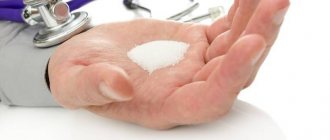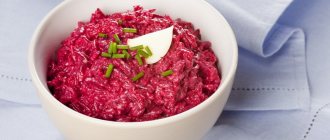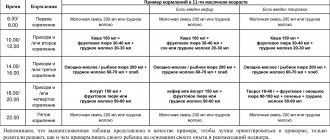Why do a general blood test?
The general analysis itself is quite simple, but informative. Blood from the finger of both a small and an adult patient is taken to determine many of its indicators:
- Sugar level, more precisely glucose (we recommend reading: normal blood glucose levels in a child by year). The main conclusion regarding this parameter is whether or not there are signs of diabetes in the body.
- Platelets are indicators of blood clotting characteristics (we recommend reading: reasons why platelets in a child’s blood may be elevated).
- Hemoglobin will tell you how oxygen circulates in tissues and organs (we recommend reading: what should normal hemoglobin be like in newborns?). Its norm or deviation will indicate dehydration, malfunction of the lungs or heart, the body’s adaptation to changed conditions (for example, among athletes), and poisoning. Most often, hemoglobin levels are tested to find out whether a person suffers from anemia - a lack of iron in the body.
- Monocytes are indicators of the fight against inflammation (we recommend reading: reasons why monocytes are elevated in a child’s blood).
- Leukocytes are the shield of immunity. Their abnormal number will indicate the presence of an infectious attack on the body.
- Eosinophils are cells that signal allergic reactions, purulent infections, and the introduction of parasites (we recommend reading: why are there elevated eosinophils in a child’s blood?).
- The ESR parameter determines the erythrocyte sedimentation rate (we recommend reading: what level of ESR in a child’s blood is considered normal?). The indicator is important in diagnosing inflammation and pathologies.
Basic rules for preparing for analysis
In order not to distort the results of the study, many experts prohibit eating before donating blood from a finger prick, but there are other factors that can affect the result. For example, it is affected by certain medications that a small patient may be taking. To make the analysis informative, prepare for it in advance:
- A visit to the laboratory is planned for early morning, preferably from 7-00 to 10-00. Many laboratories work until 12-14 hours, but it will be difficult for a child who has not had breakfast to wait for this time. In addition, in the afternoon, blood counts change.
- Before blood sampling, no visits to the X-ray room or physical procedures are planned. This affects the result.
- The interval between the last meal on the eve of the test and the blood sampling procedure is 12 hours. An abundance of sweets, baked goods, and fried foods in the diet is prohibited. Otherwise, the laboratory picture will change, especially regarding the number of leukocytes.
- It is allowed to drink clean water in moderate portions without additives, dyes, preservatives and sugars. Teas, compotes, fruit drinks, decoctions, and milk are also prohibited.
Before taking a general blood test, you are allowed to drink clean water in small quantities.
- In case of ARVI, the test is prescribed to determine the complexity of the course of the disease - it is taken as directed by the doctor. When there is a planned visit to the laboratory, during an acute period of respiratory diseases it is canceled and postponed for 1.5-2 weeks from the moment of recovery.
- It is better to exclude any worries before the procedure and cancel training with increased load.
- After operations and major interventions, the study is planned a week later.
The laboratory assistant or doctor should be notified of any deviations from the rules. If the patient is taking medications that may affect the interpretation of the analysis, the doctor will advise on what can be done in this case. Sometimes a break in therapy is allowed.
Blood from a Finger Donated on an Empty Stomach or Not: Preparation for Adults and Children
During the next appointment with the doctor, it was prescribed to donate blood from a finger prick. But the patient forgot to ask how to take it correctly in order to get the most reliable result. And are there any food restrictions on the day before the test? Can I have alcohol? And why does the blood change in general, and how will it affect it? They take very little there. Let's take a closer look.
Blood from a finger for analysis
Getting ready for delivery
First of all, it’s worth figuring out why you donate blood from your finger. In any case, finger blood is given on an empty stomach and before 11 am, but there is a slight difference in the hours of fasting before donation. The minimum number of hours after the last meal is 7-8. If you need to identify lipids or take a glucose tolerance test, then your last meal should be no less than 13-16 hours ago. This is important, as it can blur the real picture of the body’s condition, and the doctor will prescribe unnecessary medications, seeing a distorted picture of reality.
In the morning you cannot eat or drink anything except non-carbonated pure mineral water. You cannot drink coffee, tea, sweet soda or compote. This will especially affect glucose and diabetes tests. You should not drink alcoholic or toxic drinks on the eve of the test, and especially in the morning. This not only harms your health, but also turns reliable results into false ones, which will have to be taken again.
Is it necessary to donate blood from a finger prick on an empty stomach? Of course, otherwise all the results will be either completely or partially incorrect.
If you have to donate blood several times at regular intervals, you should try to donate each time at the same time and at the same time on an empty stomach.
You should not eat fried, salty or spicy foods the day before the test. Also, you should not dramatically change your diet on these days. After all, significant changes in a person’s routine can also provoke strange changes in the blood for a short period. For example, if a person has never eaten spicy adjika, then the evening before donating blood, you should not start consuming it. It is advisable to avoid heavy physical exertion and emotional stress. A break in food at the time of donating blood should not exceed 16 hours, as this will provoke undesirable consequences and the release of toxic substances into the blood.
If the patient takes certain medications daily, then you must tell the doctor about their use, who will clarify whether they need to be stopped before donating blood.
In no case should you voluntarily discontinue vital medications, which may not even affect the parameters being studied.
Also, do not rub your hands or fingers before drawing blood. This will increase white blood cells, which will spoil the results of the study. You should not take it immediately after running or long brisk walking. Any stress that affects breathing requires at least minimal rest before donating blood.
Donating blood by a pregnant woman
There are several recommendations that should be followed by a pregnant woman who is going to donate blood from a finger prick on an empty stomach. How to donate blood from a finger on an empty stomach during pregnancy:
- If you are taking any medications, you should ask your doctor when they are eliminated from the body so that you can take the medication on time and by the time of the test so that it has time to be eliminated.
- If the path to the laboratory was long, then you should sit for a few minutes near the laboratory, calm down, restore your breathing and balance, and then go into the room.
- If you feel excessive stress, fatigue or extreme agitation, then donating blood should be rescheduled to another day when your health condition becomes stable.
- If tests and procedures are scheduled for the same day, you must first donate blood so as not to put unnecessary strain on the body before taking the test.
- If it’s completely unbearable, then a pregnant woman can have a little snack. The main thing is to remember that some foods cause increased cholesterol, inflammation and infection in the blood.
Important factors when donating blood will be not only the time of hunger, but also the period of pregnancy of the girl. These factors influence hemoglobin along with the appropriate menopause. Regular blood donation is absolutely necessary if a pregnant woman has chronic problems with internal organs. Using this analysis, you can evaluate many metabolic processes that occur in the body of a woman of reproductive age.
How to donate blood with baby
All children have to donate blood. First in the maternity hospital, then usually at three months and a year, unless otherwise prescribed. Also, sometimes the pediatrician prescribes a blood test if he sees something suspicious in the child’s behavior - he is not gaining weight well, he is restless or nervous. Tests are taken to find the reason for the baby’s behavior. Finger blood is donated on an empty stomach by children who have been prescribed a serious vaccination. This is done to identify possible poisoning or inflammation in the body and not to aggravate the condition with vaccination.
It is not recommended to feed your child before donating blood, as this may distort the results obtained. If you do not comply with this common-sense requirement of medical personnel, then there is a possibility of receiving unreliable tests. Such blood samples usually have significantly higher white blood cells or lower hemoglobin levels.
Attention! The baby should not be sent for blood donation after an X-ray, ultrasound or physiotherapy.
If all this is scheduled for one day, then first of all you need to go to donate blood. If this is possible, the child should sit quietly for some time before being admitted to the laboratory, gain strength and get normal blood counts.
In newborns up to five days old, the results can vary greatly - both a hemoglobin level of 110 g/l and 240 g/l are considered normal. The older the child, the closer his indicators are to normal in adults. An extremely important indicator is an acceptable number of platelets, which impede blood clotting. And ESR is the rate at which red blood cells settle. If the ESR results are exceeded, this indicates the appearance of inflammation or an acute infection.
Products: which ones you should eat and which ones you shouldn’t eat
There are a number of products that will help improve blood composition and eliminate the need for electrophoresis. It is worth paying attention to rutabaga. This plant is unpretentious and rich in large amounts of protein, iron and expectorant properties.
Eating foods such as fatty meats and dairy products before donating blood will cause fats to appear in the blood. And you should not use mayonnaise and margarine at all, especially before donating blood. It is worth limiting your intake of honey, as it contains a lot of glucose.
Don't pay attention to products that have a lot of white parts. The glycemic index may well rise due to eating bananas and green grapes.
It is also forbidden to eat too sweet foods - cake, assorted pastries and jam. You should not smoke at least one hour before donating blood. Before entering the office, you can drink a glass of cold water. This will help you feel more confident and at ease. Try to relax and not think about what is happening at the moment.
Features of blood sampling for general analysis in infants
As in other cases, to perform a clinical analysis, capillary blood will be taken from the baby from a finger.
The rule “not to eat before donating blood” does not apply to babies in their first year of life!
Children under 1 year of age are not required (and most often impossible) to go without food:
- Newborns will have to undergo blood tests more than once in the first week of life. There is no question of abstaining from feeding the baby.
- It is impossible to explain to babies under one year old why they were not fed before the painful procedure. Breakfast is a must for them - milk, porridge, vegetables, lean meat, depending on what the baby is accustomed to eating. Then there is a break of 3 hours, and you can go to the laboratory. The algorithm is this: wake him up early, feed him, go for a walk and wait the right time, go and donate blood.
- Psychological preparation before taking the exam is important. In the evening, the baby is offered a quiet game or shown a cartoon with a doctor character. In the morning they tell him where they are going and why. Be sure to buy a children's scarifier for drawing blood.
How is a general blood test taken: from a vein or from a finger?
Blood for general analysis is taken both venous and capillary . That is, both from a vein and from a finger.
Analysis from capillary blood (from a finger) is less accurate: there is a high probability of distortion of the results associated with the blood collection procedure (tissue compression, penetration of tissue fluid, platelet aggregation, formation of microclots, etc.
) Therefore, today a clinical blood test is taken from a finger only in cases where collecting venous blood is difficult or impossible.
For example, with severe burns, when the patient’s veins are too small and thin, if there is a tendency to venous thrombosis, etc.
In newborns, a general blood test is usually taken from a finger prick.
How does a general blood test differ from a clinical one?
These two concepts are generally synonymous . It is worth noting that there is a detailed general blood test with a leukocyte formula, which allows the doctor to more accurately determine the cause of the disease. But please note that such an analysis is also called general or clinical.
How to take a general blood test, on an empty stomach or not?
To avoid distortion of the results, it is better to take a general blood test on an empty stomach .
Is it possible to smoke before taking a blood test?
Under the influence of nicotine, a large number of different hormones are produced that are aimed at suppressing the toxic effects.
In addition, immediately after smoking a cigarette, the number of red blood cells in the blood increases sharply, and the level of leukocytes decreases.
As a result of this process, not only does the viscosity of the blood increase, which inevitably affects the integrity of the blood vessels, but its structure also changes, and this cannot but affect the conduct of research.
Therefore, to obtain the most reliable data about the state of your own body, it is not recommended to smoke for 1-1.5 hours before the test.
Does alcohol affect blood tests?
You must not drink alcohol before taking the test ! There are several main reasons why drinking alcohol before a blood test is prohibited.
Alcohol reduces sugar and hemoglobin levels, negatively affects the content of red blood cells, and increases cholesterol levels. As a result of the action of alcohol in the liver, a decrease in lipid metabolism is observed.
This indicator in the human body is very important before surgery. Therefore, doctors do not allow the consumption of alcoholic beverages on the eve of laboratory tests.
Medical staff recommend stopping drinking alcohol two days before the tests.
When conducting tests for hepatitis, HIV, syphilis and some other diseases, you should not drink alcoholic beverages for at least 72 hours before the examination.
Due to the influence of alcohol, examination results may be greatly distorted.
If a person abstains from drinking alcohol on the eve of laboratory tests, in this case it is possible to obtain reliable results, establish the correct diagnosis and prescribe the necessary treatment.
General requirements before taking a general blood test
- Eliminate alcohol from your diet 24-72 hours before the test
- Children under 1 year of age should not eat for 30-40 minutes before the test.
- Children aged 1 to 5 years should not eat for 2-3 hours before the test
- Do not eat for 8 hours before the test, you can drink clean still water
- Avoid physical and emotional stress for 30 minutes before the test
- Do not smoke for 1-1.5 hours before the test
Where to get a general blood test in St. Petersburg?
A general blood test is accepted in many clinics, laboratories and medical centers in St. Petersburg. Including at the SKLIF medical center. Availability of a large amount of honey.
institutions where biomaterial is accepted, allows you to significantly reduce the load on each of them as a whole and separately, and also makes it possible to obtain test results quickly and without queues.
At the SKLIF medical center you can also take a general blood test at a very competitive price.
Deadline for performing a blood test
The study requires 1-3 days . Urgent blood tests are performed within one business day .
Validity period for general blood test
The validity period for the results of a general blood test is 10-14 days . After this period, if necessary, the doctor may prescribe a repeat study.
General blood test: price
The cost of a blood test varies depending on the laboratory or clinic where the biomaterial is accepted. At the SKLIF medical center, all necessary tests are accepted at a discount of -40%.
We remind you that in order to take tests, you additionally need to pay for the services of the treatment room Cost of services of the treatment room: View the full price list Collection of smears for enterobiasis Collection of other types of smears
Gynecological smears are taken by a gynecologist. If you come only for analysis, then you do not need to pay for the appointment.
As always, you can ask all your questions to our administrators online or by phone9
Should a child over one year old donate blood on an empty stomach or can he be fed?
A general blood test for children over one year old is taken on an empty stomach - this is an unbreakable rule. It applies to both children and adults. The attending physician needs real indicators of how the patient’s body works.
If there is a suspicion of an infectious process, inflammation, or exacerbation of a chronic disease, then this is exactly what the doctor will confirm or refute through analysis. If the patient is getting better, this should be visible in the study results.
Example: a child was fed before the study, food components, when absorbed into the blood, caused a change in its composition, affecting viscosity, leukocyte formula, the ratio of proteins, fats, and more. In the transcript, the doctor sees signs of an inflammatory process that are not actually there. Therapy is prescribed that is unnecessary and dangerous for the patient. This outcome will not please any parent.
It’s good if the doctor finds out the reasons for the false readings. If not, then additional examinations and procedures may be prescribed, which is tiring for the baby and ineffective in general.
An exception is made only for young patients suffering from diabetes mellitus and pancreatitis (we recommend reading: features of diabetes mellitus in children and treatment). Long breaks between meals and donating blood on an empty stomach are contraindicated for them. Before blood tests, such children are recommended to eat a small portion of cereal porridge with water, fresh vegetables or crackers, and cheese.
The conclusion is simple - all other categories of children (over 1 year old) undergo a general blood test strictly on an empty stomach, subject to simple rules. Children are prepared in advance for the procedure and its importance is explained. To make everything go smoothly, the visit to the laboratory is made early in the morning. Then the baby can and should be fed.
One of the points that still confuses patients is the question of why blood is donated on an empty stomach? This condition, which is used by many tests, cannot always be fulfilled; for example, it is difficult to do this for pregnant women or very young children. In such cases, the rules for blood sampling are often violated or some loopholes are looked for. You can find out below how to prepare for the procedure so that the final test results are as close to the truth as possible.
Clinical blood test: fasting or not
A general blood test is the easiest and most informative way to find out about your health. At the same time, it is not necessary to be sick; you can donate biomaterial for preventive purposes. The result of the study depends on how seriously we approach the issue of preparing for the study.
It seems that there is nothing complicated in the process: I got up early in the morning and went to the laboratory. However, the most common question from patients is the following: “How to properly take a general blood test: on an empty stomach or not?” This fact worries many for good reason: after all, a child is unlikely to endure hunger, and a pregnant woman suffering from toxicosis can aggravate her already unenviable state of health.
A few words about analysis
A clinical blood test is a study that has been the main way to determine the condition of all body systems for many years. It shows how all processes in the body occur and can reveal hidden pathologies at an early stage.
A general blood test (sometimes we will call it a CBC) is a kind of starting point in identifying the disease and prescribing appropriate treatment. Just imagine how many liters of blood we would need to donate if the doctor prescribed a test for each disease or malfunction of any system separately each time. The key to successful diagnosis lies in the results of the general analysis. If the doctor finds something wrong, a more extensive examination is prescribed.
A general analysis shows how the main formed elements of blood work: red blood cells, leukocytes, platelets. The laboratory assistant counts their number, determines their sizes, and calculates the erythrocyte sedimentation rate, or scientifically, ESR.
Let's try to delve a little deeper into the composition of the fluid flowing in our veins.
- Most of it contains red blood cells - red cells, which give our blood the corresponding color. There are so many of them that a general blood test identifies them as a huge number with twelve zeros. The main supplier of these cells is bone marrow. It tirelessly produces 2.4 million every second.
- Platelets are the main ones for clotting. Too thin blood means a high risk of bleeding even from the slightest injury, thick blood means a risk of blood clots.
- Leukocytes guard our health. All sorts of viruses, infections, fungi first encounter “defenders” and many of them no longer reach their goal with their sabotage.
By examining blood elements, the CBC reflects the functioning of almost all body systems, which increases the chances of high-quality diagnosis and treatment significantly.
How to prepare the body before the test
In order not to be disappointed in the results obtained and not to go for a repeat blood donation, doctors advise following a number of recommendations before the test.
Medical documentation provides a certain time for consultation, which includes a story about the rules for taking laboratory tests. But in reality, the doctor does not have time to tell you everything, so you have to turn to other sources.
- A couple of hours before going to the laboratory, stop smoking. Nicotine will cause blood vessels to constrict, making it difficult for blood to flow out.
- It is better not to drink strong tea or coffee before the procedure.
- Avoid fatty foods and do not drink alcoholic beverages. This will increase cholesterol levels and affect the erythrocyte sedimentation rate.
- Stop taking medications that affect blood clotting for a while. If this is not possible, please notify your doctor and laboratory technician.
- During a viral or infectious disease, you should not donate blood. The results will be reliable only after seven days after recovery.
We must not forget that external factors can also affect the results of examinations. For example, the day before you should not get too carried away with physical activity. You will get a release of some hormones into the blood that can easily blur the true clinical picture.
If before the analysis you performed various “internal” interventions, gastroscopy, dental surgery, colonoscopy, then an increased content of leukocytes will most likely be found in the biomaterial. Therefore, you need to wait a week after the procedure and only then go to the laboratory.
Incorrect transportation often causes false results.
To be sure of the result of the analysis, take it in one laboratory. Different clinics may have different reagents. You have been assigned a control test - take it where you took the previous ones.
On an empty stomach or not? That is the question…
Sometimes the doctor forgets to say the most important thing: how do they take a general blood test - is it necessary on an empty stomach or not?
These disputes cause a lot of confusion among the population: how the food eaten before the analysis will affect its results. By the way, the doctors themselves cannot agree on a common opinion: some say that it is necessary to fast, others say that a fasting break of 3-4 hours is enough.
You should immediately define the concept of “on an empty stomach”. This does not mean that you need to fast all day the day before, and then go to the laboratory exhausted and hungry. It's not that scary. Have a good dinner, excluding any harmful things, get enough sleep, get up early in the morning, cut some sandwiches and put them in your bag. Donate blood - start eating. In this case, you will ideally fulfill the “fasting” requirement.
We will take the traditional opinion of most medical workers: to eliminate possible misunderstandings in the results of the study, blood should be donated on an empty stomach, observing a twelve-hour pause between meals.
However, this requirement cannot be considered strict. The thing is that the OAC examines the formed elements of the blood, which food cannot influence in any way. Therefore, an hour to an hour and a half before the delivery of the biomaterial, you can allow yourself a light breakfast without butter and a variety of sausages and smoked meats, and after eating you can safely go for the procedure.
All these conditions apply if the biomaterial is taken from a finger from adults.
If you donate blood for clinical analysis from a vein, which is now becoming a common practice, then you should refuse to eat. Even water and chewing gum are excluded.
Pregnant women are a special category of adults.
While waiting for a baby, the load on the body increases significantly; hunger can have a negative impact on a woman’s well-being. That is why you should not take risks and experiment with your health! Pregnant women donate blood three hours after eating.
How to get your child tested
When the time comes to donate blood to a child, any parent worries whether to donate on an empty stomach or not, whether the donation conditions are the same for babies and older children.
In any case, preparation begins with a psychological attitude. Fear of people in white coats in the treatment room can cause crying and hysterics, which will lead to the release of hormones into the blood that can change the results.
A general blood test in children is the first test that is prescribed in the first days of a baby’s life.
Accordingly, the question arises of how to donate blood to a newborn. Of course, for infants who eat every three hours, there can be no question of any hunger pause. Blood can be taken either immediately after feeding or a little later. It's better if it's three hours.
Children under one year old do not donate blood on an empty stomach!
If the child is more than a year old, then you need to try to comply as much as possible with the requirements for preparing for the delivery of biomaterial. The baby can be patient a little and eat later - donate blood, excluding breakfast.
If the baby cannot tolerate hunger, then do not irritate the little person, feed him and go to the treatment room after 3 hours. Your main task is to distract the child as much as possible during the blood draw. This way you will eliminate stress and nervousness.
The older the child, the stricter the requirements. Obviously, a seven-year-old boy or a ten-year-old girl will be able to endure and donate blood on an empty stomach. In this case, parents will definitely not have doubts about the reliability of the results.
A general blood test is so simple and so informative. Proper preparation and a conscientious approach will help you get the most reliable information about your health. Whether to donate blood on an empty stomach or not depends on your age and general health. If you don’t know what to do, check with your doctor.
What it is
Before moving on to how to take general blood tests, it is worth considering general information that will help you understand why a general blood test should be performed at all. When blood is taken from the fingers for testing, the analysis allows you to calculate the general parameters of blood cells. Hemoglobin is counted and the leukocyte formula is determined. The ratio of plasma to blood cells is checked.
If there are any deviations from the norm in the biological fluid taken, the doctor will be able to suspect disturbances in the body, and therefore take timely measures. How is a general blood test done? The sample is taken on an empty stomach. Blood is donated from the ring finger. However, sometimes the rules for donation change, and biomaterial is taken from a vein. Why is blood taken from a vein? Donate blood from fingers only if checking the erythrocyte sedimentation rate is not required. If it is important for a doctor to know this indicator, then by taking a sample from a finger, the laboratory assistant will not be able to carry out a correct calculation. In addition, doctors often offer to donate blood for a whole range of tests, within which there is a whole list of studies carried out. In this situation, a venous sample is suggested for a general blood test.
Depending on where the blood is taken from, there will be a different way of testing. So, when taking blood from a finger on an empty stomach, a small puncture is made on the skin, and the protruding drops are taken into a test tube with a pipette. From there a sample is taken for research.
Preparing for the study
Having properly prepared for the test, you can count on results that are as close as possible to your real indicators. To do this, before the analysis, it is important to give up such a bad habit as smoking, at least for two hours. Such preparation for the test is mandatory due to the negative effects of nicotine on the vessels located along the periphery of the body. We are talking about their strong spasm. As a result, when blood is taken from the ring finger, collection may be difficult and additional punctures will have to be made.
Preparing for a general blood test excludes caffeine-containing drinks for the same reasons, especially strong drinks. It is not recommended to consume high-fat foods or alcoholic beverages during the day. The fact is that if you eat incorrectly, the ESR indicator will be incorrect, which will lead to an incorrect diagnosis.
How to take a general blood test correctly? Stop taking medications that may have an effect on clotting ability no later than 24 hours in advance. We are talking about most popular non-steroidal analgesics. How to take a general test for a preventive examination if you are sick? No way. As planned, the sample is given on an empty stomach only after a week has passed after recovery. We are talking mainly about viral diseases. Donation is not allowed in this case, since viruses have a strong effect on the composition of the blood at the cellular level.
Many people answer the question of how to take general blood tests - on an empty stomach. However, the rule “you cannot eat before donating blood” is not 100% strict. If we are talking about biochemistry, then the answer to the question of whether you can eat before taking the exam is clearly negative. This requires an 8-12 hour fast. Why can't you eat? This will change the indicators by which the condition of the internal organs is determined. Before a general blood test, in comparison with biochemical studies, you can have breakfast. It is important to know what you can eat and what time interval between food and donation is important to maintain. You can eat something light about two hours before your test. However, the answer to the question of whether you can eat sweets is negative. It's better to choose something vegetable. Now you know how to take a clinical blood test correctly.
A reminder to patients on how to get tested correctly
For most studies, blood is taken strictly on an empty stomach, that is, when at least 8 hours have passed between the last meal and blood collection (preferably at least 12 hours). Juice, tea, coffee should also be excluded.
You can drink water.
1-2 days before the examination, exclude fatty foods and alcohol from the diet. One hour before taking blood, you must refrain from smoking.
Before donating blood, you need to avoid physical activity. Blood should not be donated immediately after radiation examination (x-ray, ultrasound), massage, reflexology or physiotherapeutic procedures.
Since different laboratories may use different research methods and units of measurement, it is recommended that in order to correctly evaluate and compare the results of your laboratory tests, they should be carried out in the same laboratory.
Before taking a general blood test , the last meal should be no earlier than 3 hours before the blood draw.
To determine cholesterol and lipoproteins, blood is taken after a 12-14 hour fast. To determine the level of uric acid, you must follow a diet: avoid eating foods rich in purines - liver, kidneys, limit meat, fish, coffee, tea in your diet.
Blood donation for hormonal testing is carried out on an empty stomach (preferably in the morning; if this is not possible, 4-5 hours after the last meal in the daytime and evening).
When testing the level of prostate-specific antigen (abbreviated PSA ) the day before and on the day of the test, strict abstinence must be observed. Blood should not be donated for several days after TRUS or palpation of the prostate gland (prostate).
The results of hormonal studies in women of reproductive age are influenced by physiological factors associated with the stage of the menstrual cycle, therefore, when preparing for an examination for sex hormones, the phase of the cycle should be indicated.
Hormones of the reproductive system are given according to the days of the cycle: LH, FSH - days 3-5; Estradiol - 5-7 or 21-23 days of the cycle; progesterone 21-23 days of the cycle. prolactin, DHA sulfate, testosterone - 7-9 days. Blood for insulin and C-peptide is given strictly on an empty stomach in the morning.
Thyroid hormones, insulin, C-peptide are given regardless of the day of the cycle.
General clinical urine analysis
For general analysis, only the first morning urine sample is used. The first few milliliters of urine are drained to remove desquamated cells from the urethra. Toilet the external genitalia first. Urine for research must be delivered within 2 hours from the moment of collection.
24-hour urine collection
Collect urine for 24 hours with normal drinking regimen (about 1.5 liters per day). In the morning at 6-8 o'clock you need to urinate (pour out this portion of urine), and then during the day collect all the urine in a clean dark glass container with a lid, the capacity of which is at least 2 liters.
The last portion is taken exactly at the same time when the collection began the day before (the start and end times of the collection are noted). The container with urine must be stored in a cool place.
At the end of urine collection, its volume is measured, the urine is shaken and 50-100 ml is poured into a container in which it will be delivered to the laboratory.
It is necessary to indicate the entire volume of daily urine!
Collection of urine for research using the Nechiporenko method
Immediately after sleep (on an empty stomach), an average portion of morning urine is collected.
Urine collection is carried out using the “three-glass” sample method: the patient begins to urinate in the first glass, continues in the second, and finishes in the third.
The predominant volume should be the second portion, which is collected in a clean, dry, colorless container with a wide neck. The collected medium portion of urine (20-25 ml) is delivered to the laboratory
Collection of urine for research according to Zimnitsky
The patient remains on a normal diet, but takes into account the amount of fluid he drinks per day. After emptying the bladder at 6 a.m., urine is collected every 3 hours during the day into separate containers, which indicate the collection time or portion number, 8 portions in total.
1 serving - from 6-00 to 9-00, 2 servings - from 9-00 to 12-00, 3 servings - from 12-00 to 15-00, 4 servings - from 15-00 to 18-00, 5 servings - from 18-00 to 21-00, 6th portion - from 21-00 to 24-00, 7th portion - from 24-00 to 3-00, 8th portion - from 3-00 to 6-00.
The entire collected amount of urine is delivered to the laboratory in 8 special containers.
Collection of urine for microbiological examination (urine culture)
Urine is collected in a sterile container. Collection of morning urine is carried out after thorough toileting of the external genitalia. THE FIRST 15 ml of URINE IS NOT USED FOR ANALYSIS. NEXT 3-10ml. ARE COLLECTED IN A STERILE CONTAINER WITH A LID. The container must be delivered to the laboratory by 8 o'clock.
Biochemical express analysis of stool for dysbacteriosis
2-4 g (volume 1-2 teaspoons) of feces must be collected in a special container, which must be delivered to the laboratory on the same day. It is necessary to indicate the type of stool (diarrhea, constipation, normal, stool with laxatives).
Test for enterobiasis (to identify taeniids and pinworms)
For this study, biomaterial is collected from the perianal folds (around the anus) by the patient himself. The procedure is carried out in the morning immediately after getting out of bed BEFORE HYGIENE PROCEDURES, URINATION AND DEFECATION.
Using a cotton swab, in a circular motion, material is taken from the perianal folds (where the above mentioned helminths lay their eggs). Afterwards, the stick is placed in a special container (the unused end of the cotton swab must be removed).
Thus, the material is ready for delivery to the laboratory.
External factors
Even if quality preparation has been done in terms of nutrition or the absence of negative habits, it is important to understand that external factors can also influence the results. To obtain reliable results, it is recommended to refuse:
- intense physical activity;
- stress.
Both of these factors are due to the release of certain hormones into the human bloodstream. They seriously affect the indicators that are considered the most important. Therefore, before directly entering the room where the procedure is being carried out, you need to sit in a calm environment for 15 minutes.
Excluded the day before the test, there should also be diagnostic class methods that involve an invasive course. Dental surgeries can also change leukocyte counts. For better results, it is worth eliminating such procedures a week before the expected delivery.
The reagents used to prepare the analysis can also affect the results. The point is that it is impossible to compare the results obtained from two different laboratories; they may be different. Typically, test results include normal values. If a control test is required, it must be performed in the same laboratory with the same reagents.
The indicator may also depend on how long the blood test is done and how long it takes for the collected samples to be ready for use. Sometimes long-term storage has a negative effect. This can often be observed during transportation from one laboratory to another. Due to the action of preservatives, cells are destroyed.
A little more about food
It was already noted above that for a general blood test it is not necessary to adhere to strict fasting before donation. However, there are analyzes that require exactly this behavior, which is worth considering separately.
In most cases, when it comes to fasting, it involves a complete absence of food for at least eight hours.
Only small quantities of water are allowed. Juices, coffee, tea and even chewing gum are prohibited. All these components will be perceived by the body as food, so such basic indicators as blood glucose, cholesterol and bilirubin will be distorted. By the way, speaking about donating blood on an empty stomach, it is worth noting that many laboratories ask you to limit yourself to a light dinner, and not to gorge yourself for future use.
How can a child donate blood from a finger for a general analysis: is the procedure performed on an empty stomach or not?
As the child grows, he or she is often prescribed a blood sample from a finger for analysis. The results of the study will give the doctor information about the state of health and possible pathological changes in the body. The test procedure requires a little preparation, which parents should be aware of. Mommies are especially concerned about whether it is always necessary to donate blood on an empty stomach or not? The answer to this question is very important, because young children do not tolerate hunger well. Do babies always need to fast before donating blood, or are there exceptions?
Do you donate blood from your finger on an empty stomach or not: is it possible to eat or drink water before donation?
Many people neglect one of the main rules of performing a finger prick blood test - not having breakfast before visiting the laboratory to collect blood substances. They do this not intentionally, but only because they do not understand exactly how food consumption can affect the composition of the bloodstream and thereby the results of the study. Therefore, this article is devoted to understanding whether blood from a finger is given on an empty stomach or not.
How does food affect blood health?
Products entering the stomach are sent from the digestive tract in processed form into the bloodstream. And one of the main tasks of the circulatory system is to distribute nutrients throughout the body. Depending on the food, the bloodstream is saturated with certain nutrients. For example, if a person has a high-fat dinner on the eve of a biochemical finger prick blood test, the results will show a higher cholesterol level. If you eat fish or seafood, your protein level will increase, and meat helps thicken your blood mass. Sweets and confectionery will change the glucose readings in the blood test and so on.
Any foods are rich in many different vitamins, minerals and other substances. Once in the bloodstream, these elements significantly complement the standard composition of its formed particles. And to make an accurate diagnosis, a blood substance free of metabolic products is needed.
For this reason, after a large meal and in the next few hours, the results of testing blood samples will be unreliable.
It’s good if the patient’s negligence only costs him in the form of repeated blood samples. But due to improper preparation for a clinical finger blood test, an incorrect diagnosis may be made. And instead of treating an existing disease, therapy will be carried out on a healthy organ or system. In the meantime, the undetected pathology will progress. All this is fraught with serious, adverse consequences. To prevent such developments, it is imperative to perform a finger prick blood test on an empty stomach and follow other rules recommended by the doctor.
Therefore, to the question of whether it is possible to eat before taking a finger prick blood test, the answer will be unequivocal - you cannot. Moreover, for different diagnostic methods there are different time frames regarding the amount of time from the moment of the last meal on the eve of the day of donating blood from a finger prick, from 6 to 12 hours. The more caloric the food, the more time it will take to process it, distribute it to tissues and remove metabolic products.
We recommend that you familiarize yourself with blood sugar levels and the first signs of diabetes.
Rules for preparing for a blood test
Based on this, experts recommend eating easily digestible foods for the last meal the day before the blood test. You are allowed to eat white meat, cereals, vegetables, and fruits in small quantities. It is forbidden to eat fatty, highly salted, fried, spicy and heavily seasoned foods. In addition to the condition regarding whether you can eat before donating blood, there are a number of rules that must be followed to obtain an accurate diagnosis.
A list of important conditions that must be observed before donating blood material from a finger prick:
- Blood collection is carried out only in the morning, except in cases of emergency.
- Blood mass is donated on an empty stomach due to the above reasons.
- As a mandatory preparation for a finger prick blood test, you usually need to stop taking your medications.
- Alcohol does not have the best effect on the composition of the bloodstream. And drinking alcoholic beverages for several days before a blood test provokes a whole complex of biochemical reactions in the bloodstream that interfere with correct diagnosis.
- Any physiotherapeutic procedures, be it ultrasound, fluorography, x-rays, MRI and others, affect the state of blood flow and therefore cannot be combined with the time of taking a blood test from a finger.
- Severe overheating in baths and saunas can provoke incorrect readings of the blood flow for hormones and other formed blood particles.
- If the patient adheres to any diet, especially protein, he should inform the doctor.
The influence of physical and emotional stress on the structure of the bloodstream has long been studied and proven. During intensive sports or performing work associated with heavy physical labor, an increase in the number of leukocytes, red blood cells and hemoglobin is observed, which can be interpreted as the development of some pathological process. Stressful conditions contribute to an increase in platelets and affect the production of insulin and some other microelements. To prevent such factors from distorting the results of a finger prick blood test, they should be excluded.
Features of performing blood tests in children
If it is easier for an adult to follow the rules for submitting blood samples for a general analysis, then with children, especially very young ones, things are not so simple. Children are given blood from a fingertip under the main conditions generally accepted for people of all ages - in the morning and on an empty stomach. But for mothers all over the world, the question of whether to take blood on an empty stomach or not, and whether it is possible to make an exception to the rule, still remains open.
Unfortunately, no, because the human circulatory system functions the same, regardless of age.
The question then arises: is it at least possible to drink? If the child is still very young and it is impossible to explain to him the importance of the procedure, and that you need to endure the feeling of hunger for a little while. In such a situation, it will be useful to feed him more often from a bottle with a nipple or with a special drinking nozzle. An important requirement is that drinking water must be free of any flavoring and aromatic additives; it cannot be tea, herbal decoction, or compote. Since everything that is not crystal clear drinking water is food for the body. Drinking in the morning, before you need to take a blood sample from your finger, can and should also thin the blood, so that it is easier for the laboratory assistant to take a sample of the material for research.
Taking into account the arguments presented in this article, it becomes clear that even a non-fasting blood test allowed as an exception is unlikely to be suitable for an accurate diagnosis. Therefore, in the question of whether to donate blood from a finger on an empty stomach or not, the answer is clear - only on an empty stomach. One of the reasons why blood is drawn in the morning is precisely to make it easier to comply with this condition. In the morning, the body is rested and full of energy, emotionally and physically restored, moreover, it has not yet fully awakened and does not feel strong hunger.
General (clinical) blood test: why do they take it, what does it show?
Blood for general analysis (CBC) in newborns is taken from a finger or heel, in older children - from a finger, back of the hand, forearm or vein (if there are indications for an extended examination). The study is carried out to determine the amount of the following components:
- erythrocytes - red blood cells produced by the bone marrow (it produces 2.4 million cells every second);
- platelets - blood cells responsible for blood clotting;
- hemoglobin - a protein that transports oxygen to organs and tissues;
- monocytes - leukocyte cells responsible for fighting inflammation;
- eosinophils – indicators of allergic processes;
- leukocytes - the main shield of immunity;
- neutrophils – owners of bactericidal and detoxifying properties.
A parameter like ESR is the erythrocyte sedimentation rate. Deviations from the norm indicate hidden inflammatory processes. An increase in ESR may indicate acute and chronic inflammatory diseases and indirectly confirms anemia.
Each of the indicators can be within the normal range, deviate upward or downward. A blood test allows us to judge pathological changes in the body and hidden diseases. A decrease in the level of red blood cells and hemoglobin is a symptom of iron deficiency anemia. An increase in the indicator is evidence of diseases of the hematopoietic system, cardiac and respiratory failure, and the influence of chronic diseases.
Excess platelets are the result of an inflammatory process; it is observed in tuberculosis and osteomyelitis. An abnormal increase in the indicator occurs in children born prematurely, as well as in cases of blood diseases. An excess of leukocytes may indicate a violation of the diet, a stressful situation, leukemia, or kidney pathologies. Their deficiency is the result of exhaustion.
A change in the leukocyte formula will tell the doctor a lot about the baby’s health status. Eosinophils are increased during allergies, parasite infection, and skin diseases. A decrease in the indicator indicates stress, neuroses, and bacterial infections. Monocytes above normal are observed during acute respiratory viral infections and heart failure. Their decrease is evidence of neoplasms, radiation sickness, and pathology of the hematopoietic system.
How is blood taken for general analysis?
Blood for clinical analysis in children is taken from a finger. Main indications for analysis:
- diagnosis of diseases based on complaints from the baby and his parents;
- upcoming vaccination;
- planned hospitalization;
- when prescribing drug treatment in order to select the correct drugs;
- prophylactically - carried out once a year.
Donate blood from a finger prick in a laboratory at a clinic or private clinic.
You can call specialists to your home. This is especially true when the baby is sick or there is a surge in infectious diseases and you don’t want to expose the baby to the risk of infection. Children under 3 years old can be comfortably held in their mother’s arms during the analysis. She will hold the baby’s hand and calm her down. Older children can enter the office on their own, but it is better if up to the age of 10 they are accompanied by parents who will monitor the process. Blood is taken from a finger using a disposable scarifier or lancet - a device for automatic painless puncture. It is easier to do it on the ring finger, since the skin there is very thin. The area is pre-treated with alcohol. After the puncture, the first drop is removed with a sterile ball, then blood is drawn.
The material is placed in test tubes, which are sealed and sent to the laboratory. A few drops are placed on a sterile glass and a smear is made. It is used for examination under a microscope. At the end of the manipulations, the puncture site is again lubricated with an alcohol wipe, which should be held for several minutes until the bleeding stops. The baby may be frightened by such actions of the laboratory assistant.
Can a child eat before donating blood?
In order for the result of a child’s routine blood test to be accurate, you must adhere to certain rules: donate blood in the morning (7–11 am) and on an empty stomach. Most experts believe that eating even a small amount of food leads to an increase in the number of white blood cells, which makes diagnosis difficult. Other doctors believe that there is no reason to torture the baby with prolonged fasting; they recommend abstaining from food and drink 3 hours before the procedure.
The question of whether children can eat before a blood test or not is decided individually depending on the age and health status of the baby. The general rules are:
- It is difficult for babies under one year to withstand long breaks between feedings, so it is recommended to donate blood in between. For example, a mother feeds her baby at 6 and 10 am. The best time to submit biomaterial for analysis is about 8 hours. Blood is taken from newborns at any time.
- For children older than one year, the sampling is carried out strictly on an empty stomach. An exception is made for children who suffer from pancreatitis and diabetes. Such children are allowed to eat a small portion of porridge with water or crackers with tea 2–3 hours before the test. The rest of the children are not even allowed to drink water. If your baby is thirsty, you can rinse your mouth with water, but do not swallow. Immediately after the procedure, the child should be fed well.
- The day before the procedure, you should not tire your baby out with physical exercise or feed him sweet, starchy, spicy or salty foods. A calm atmosphere in the home and the psychological preparation of the baby are important. You should not deceive the baby by saying that it will not hurt. It should be said that you need to be patient, because what the doctor does in the medical office is important for the health of the baby.
Rules for preparing for laboratory tests in children
Recommendations for drawing blood from children under 14 years of age:
Psychological preparation of a child before donating blood:
- The main requirement for mom is to remain completely calm. Children, especially toddlers, feel their mother’s mood very keenly and also begin to get nervous if she is afraid of the upcoming procedure.
With a child who has already reached preschool or school age, discuss what will happen. You should not scare him, especially if he is donating blood for the first time.
You can also warn that the child will most likely experience discomfort.
- Make sure your child is not bored before the blood is drawn. Take with you a book, his favorite toy, a coloring book with markers - depending on the age of the child. This will not only take up his time, but will also not allow him to concentrate on the fear of the upcoming procedure.
- Decide whether you need to be present in the doctor's office during the test. Of course, it will be needed if the child is very small, but for some schoolchildren, even in the lower grades, the presence of parents can only interfere and provoke tears or protest. Focus on the child's psychological characteristics.
- During the blood collection procedure, small children should be held in your arms. If a child feels the warmth and protection of his mother, he reflexively calms down even in an unfamiliar and frightening environment.
- It is advisable to begin drawing blood not immediately after entering the treatment room. You need to give the baby a couple of minutes to get acquainted with the situation and the stranger who will take him by the hands.










